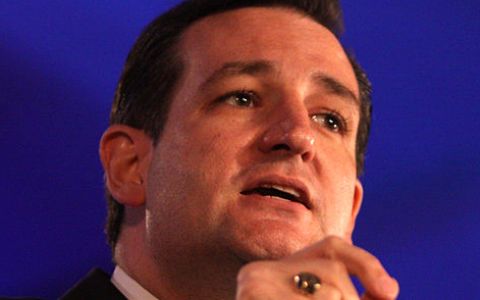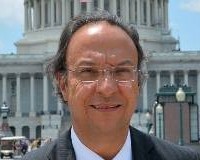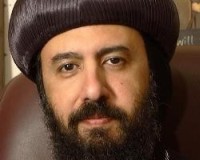Senator booed off stage at historic summit on Middle East Christians
by - 12th September 2014

ORGANISERS of an inaugural event held in Washington to highlight the persecution of Christians in the Middle East have said they remain focused and ‘undaunted’ after an incident in which a US senator was booed off stage for his support of Israel.
Attendees at the inaugural In Defense of Christians (IDC) Summit heard warnings that the brutality facing Christians and minorities in the Middle East is only worsening; and were reminded of the need for a united effort to bring an end to the atrocities to prevent further destabilisation in the region.
On Wednesday, Ted Cruz, a Republican junior United States senator from Texas, was speaking during the gala dinner at the summit, which has drawn together global leaders in the US capital over the past three days, including some reported to be supporters of Hezbollah and president of Syria, Bashar al-Assad.
No greater ally
Toward the end of his keynote address, he said: ‘Christians have no greater ally than Israel.' His remarks sparked boos from some in the audience, to which Senator Cruz continued: 'Those who hate Israel hate America. Those who hate Jews hate Christians.’
Unable to continue, he left the stage, saying: ‘If you will not stand with Israel and the Jews, then I will not stand with you.’
Organisers of the historic event – which is the first time six Christian patriarchs from the Middle East have gathered together in the US – were keen the incident did not detract from the aims of the summit.
 Speaking in response, Toufic Baaklini, president of In Defense of Christians, said the organisation remained ‘undaunted’. He added: ‘A few politically motivated opportunists chose to divide a room that for more than 48 hours sought unity in opposing the shared threat of genocide, faced not only by our Christian brothers and sisters, but our Jewish brothers and sisters and people of all other faiths and all people of good will.
Speaking in response, Toufic Baaklini, president of In Defense of Christians, said the organisation remained ‘undaunted’. He added: ‘A few politically motivated opportunists chose to divide a room that for more than 48 hours sought unity in opposing the shared threat of genocide, faced not only by our Christian brothers and sisters, but our Jewish brothers and sisters and people of all other faiths and all people of good will.
‘Tonight’s injection of politics when the focus should have been on unity and faith, momentarily played into the hands of a few who do not adhere to IDC’s principles. They were made no longer welcome.
‘When we set out to form In Defense of Christians, many in the foreign policy and faith-based communities said such an effort was impossible. That it would be too difficult to bring such a diverse group of Christian sects, religious and human rights organisations together to draw attention not only to the plight of the deteriorating situation facing our Christian brothers and sisters, but also to the plight of all people of faith in the Middle East who are suffering.
‘For more than 48 hours, our initial IDC conference was successfully bridging divides of faith, language, geography and politics. It has not been easy, and not without challenges. Tonight’s events make clearer than ever, that In Defense of Christians is desperately needed in a world that remains divided to the point where even the most fundamental value of life and human dignity are cast aside.’
Historic meeting
The historic meeting of patriarchs from the Middle East was a show of solidarity to draw world leaders’ attention to the plight of ancient Christian communities facing human atrocities in the region.
Maronite Patriarch Cardinal Rai, Syriac Patriarch Ignatius Aphrem II and Bishop Angaelos, General Bishop of the Coptic Orthodox Church in the UK were among those in attendance at the historic summit.
Giving a keynote address, Bishop Angaelos said the Christians and minorities in the region were facing widespread brutality which was intensifying. He also warned however that discussion around the atrocities must not be confined to religious dialogue, but seen as a violation of human rights which will have far-reaching implications.
Extremism
‘Heightened levels of extremism seek to eradicate indigenous Christian communities that have been a vital part of the identity, culture and heritage of the Middle East for over two millennia.
‘The model of intolerance and extremism that we are witnessing will become legitimised and replicated throughout the Middle East and further afield if left unchallenged, and will continue to marginalise, alienate and destroy all in its path.’
Bishop Angaelos added: ‘Rhetoric used to describe the atrocities in the Middle East must no longer remain within a religious framework, but rather deal with these events as unacceptable crimes against citizens of countries who are entitled to the basic rights and freedoms of all. It is within this context that the international community must commit itself to providing, supporting, and advocating, in every way it can, for Christians and others whose fundamental right to freedom of Faith is denied in Iraq, Syria, Egypt and the wider Middle East.’
 Last week, Bishop Angaelos joined other Christian leaders from the Middle East, at Lambeth Palace where they met with the Archbishop of Canterbury, Justin Welby as he spoke of a ‘state of emergency’ in the Middle East for Christians and other minorities.
Last week, Bishop Angaelos joined other Christian leaders from the Middle East, at Lambeth Palace where they met with the Archbishop of Canterbury, Justin Welby as he spoke of a ‘state of emergency’ in the Middle East for Christians and other minorities.
He said: ‘We gather today as Christians, including those originally from the Middle East, to stand in solidarity and prayer with our brothers and sisters, who seek to practice their faith and belief in lands where they have been a continuing presence since the beginning of Christianity.’
He called for justice ‘without impunity’ to be served and said those suffering in the region require ‘us to act and bear witness to their plight, whatever ethnic group or religious minority they come from’.
